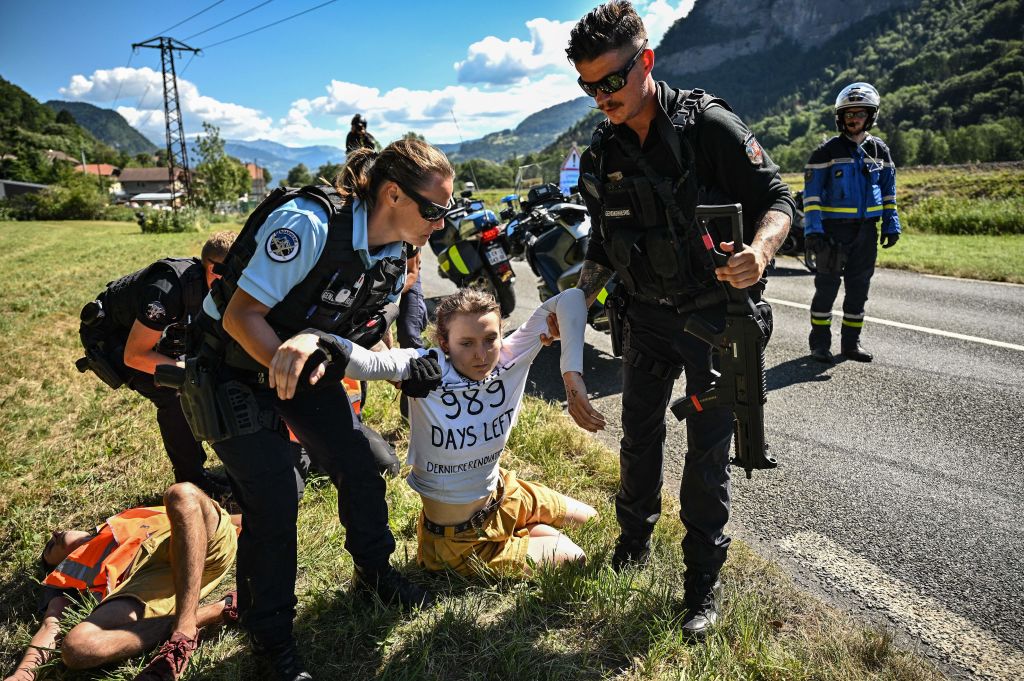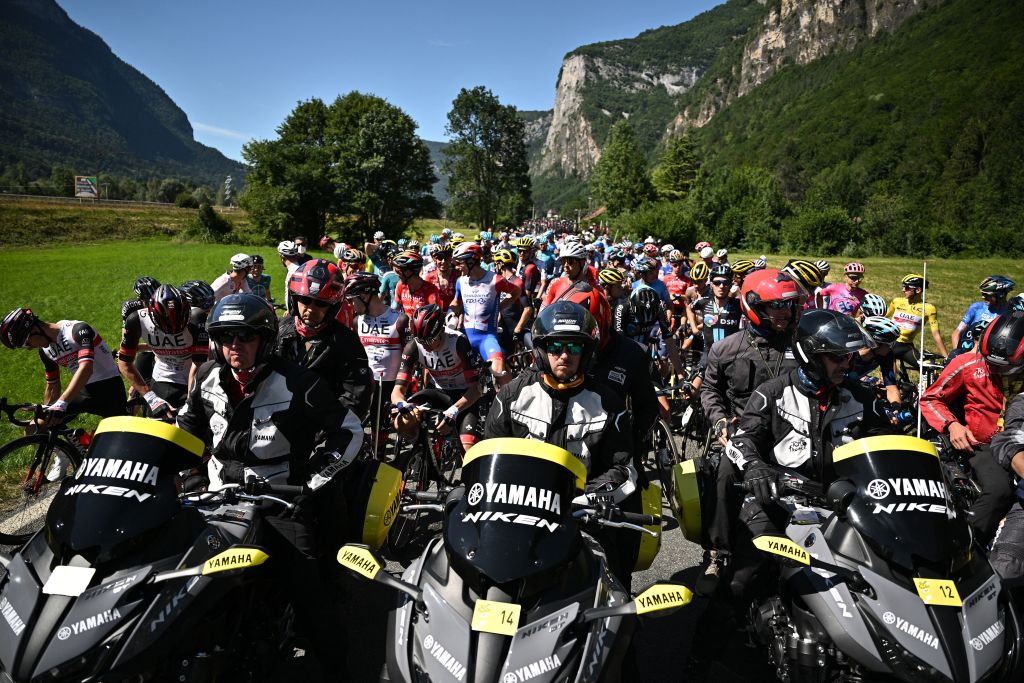Tour de France in no position to shrug off climate action protest
'They're protesting about a good thing, but it's not great when it's at the front of the race'

The bicycle may be a most ecologically-sound mode of transport, but the great bike race is a different proposition. While some attempts have been made to offset the event's carbon footprint in recent years, there is no escaping the sad fact that the Tour de France was not an altogether inappropriate target for peaceful environmental protests of the kind witnessed on stage 10 to Megève.
The logistics of bringing a rolling village of approximately 4,000 people around France has made it so. As of last year, ASO claims that 100% of the carbon emissions produced by the Tour organisation itself are offset, but those calculations do not factor in the emissions produced by the team staff, journalists, sponsors, corporate guests, fans and assorted suiveurs following the race across its three weeks.
In 2021, when QuickStep announced that they had become the WorldTour's first carbon-neutral team, they published a sobering calculation of the emissions they had needed to offset during the season. The estimated 1288 tons of CO2 produced by the team in a year is equivalent to driving a car 179 times around the world or making 539 return flights between Brussels and New York.
Such figures were far from the minds of the men chasing the stage victory from the breakaway on the road to Megève on Tuesday afternoon, and it was understandable that the riders in the move were more concerned with the stoppage itself than the message behind it when they spoke to reporters immediately after the finish.
Alberto Bettiol (EF Education-EasyPost) was alone at the head of the race with 37km remaining when he encountered the protestors from the 'Dernière Renovation' climate action group, which had made a similar demonstration at the French Open tennis earlier this year. The eight protestors sat in the road and set off a flare as the race approached, with some wearing t-shirts bearing the legend "We have 989 days left" in a call for urgent action on the climate crisis.
The Italian was able to ride past the protestors, as was the chasing group behind him, but it was clear that the body of the peloton – not to mention the cavalcade of cars behind them – would not be able to make it through safely. The commissaires quickly decided to stop the race until police had removed the protestors from the road. After a stoppage of 12 minutes or so, first Bettiol and then the chasers were allowed to set off with their buffers over the peloton intact.
"I saw them from a distance, and I knew something was up. I was able to get through, but I knew the bunch wouldn't be able to get through because there were quite a few of them and they were pretty determined," said Bettiol, who added that he was unaware that it had been a climate action protest. "These are things that happen, but they shouldn't happen, because in the end, we're working and they could do it differently."
The latest race content, interviews, features, reviews and expert buying guides, direct to your inbox!
Fred Wright (Bahrain Victorious) was in the group chasing Bettiol and, like the Italian, his first instinct was to squeeze through the gap and continue racing. "Your instant reaction is, 'OK, I need to get through this as quickly as I can,' but you forget there's loads of cars that also have to get past," Wright said.
Wright would proceed to ride strongly on the final climb to Megève in a bid to tee up teammate Luis Leon Sanchez for victory, though the spoils would ultimately fall to Bettiol's companion Magnus Cort. He explained, however, that the restart, which put him in mind of taking a break on a training ride, had been difficult to process.
"It was like when you stop at the café, the same feeling," Wright said. "I figured it was some kind of climate protest, and you almost know that straight away. They're protesting about a good thing, but it's not great when it's at the front of the Tour de France."
Prudhomme

Wright's calm acknowledgement and understanding of the bigger issue contrasted with the lamentably blinkered view presented on France Télévisions' post-stage analysis programme Vélo Club, where the very cause the protestors were highlighting was – deliberately – not even mentioned.
"There's no question of talking about it, we're here to talk about cycling," said Laurent Jalabert. Then again, the Frenchman is no stranger to reticence when faced with uncomfortable questions. "There are 10,000 causes that could demonstrate on the race," he continued.
Tour director Christian Prudhomme made a brief appearance on the programme, where presenter Laurent Luyat limited himself to one vague question about the stoppage, but again, there was no discussion of the rationale behind it.
"It was unexpected and untimely. That happens on the roads of the Tour de France because it can be a big soap box," said Prudhomme. "That happens sometimes, but we're rarely blocked for a few minutes like that, and fortunately the race was able to start again. It happened at Rolland Garros, it happened at the Formula 1 at Silverstone, it happened in the German football league, and it happened again today here."
There was a time when there seemed to be a tacit accord between the Tour organisation and protestors who used the race to alert the watching public to their causes. Race director Jacques Goddet, so the saying went, was France's president for the month of July. And so, as the Tour travelled around the L'Hexagone, striking workers or protesting farmers would meet with the country's temporary premier, and a quid pro quo would invariably emerge – the protestors' grievances were given a public platform while the race continued largely unhindered.
That unspoken social contract seemed to break down 40 years ago, as the journalist Dan Perez outlined in L'Équipe earlier on this Tour. In 1982, steelworkers from Usinor protested the imminent closure of their plant in Denain, and their blockade caused a Tour stage to be cancelled for the very first time. In the four decades since the Tour's ear for social protest has closed like a fist. Witness, for instance, the tear gas police used to disperse a farmers' protest in the Aude in 2018.
"It was as if this episode marked the first division of the paths of workers and of cycling, which had for so long been intertwined," Perez wrote of the 1982 cancellation. "The Tour would certainly remain free, accessible to proletarians, but the athletes hurtling down the road on their bikes were starting to belong to them no longer."
Yet despite what Vélo Club would have us believe, the Tour, which uses France itself as its canvas, cannot pretend to exist in a vacuum. The television cameras that gladly show us France's picturesque chateaux and vineyards should not automatically turn away when faced with the concerns of its citizens. Team sponsors, meanwhile, include car manufacturers and petrostates, and there is clearly considerable work to be done to offset the overall carbon footprint of the Tour and of the sport as a whole.
"I don't really know the exact numbers of what's going on, but hopefully we're offsetting some of that by encouraging people to get on bikes and promoting a healthy lifestyle," Neilson Powless said when he arrived at the EF Education-EasyPost bus after the stage. Mercifully, Jalabert's head-in-the-sand approach is not shared by everybody in the contemporary peloton.
"I think it's going to be impossible to quantify anything, but I'm all for cleaning up the environment and everybody trying to do their part to offset their carbon footprint. Hopefully, it's going to get better in the next few years."

Barry Ryan was Head of Features at Cyclingnews. He has covered professional cycling since 2010, reporting from the Tour de France, Giro d’Italia and events from Argentina to Japan. His writing has appeared in The Independent, Procycling and Cycling Plus. He is the author of The Ascent: Sean Kelly, Stephen Roche and the Rise of Irish Cycling’s Golden Generation, published by Gill Books.